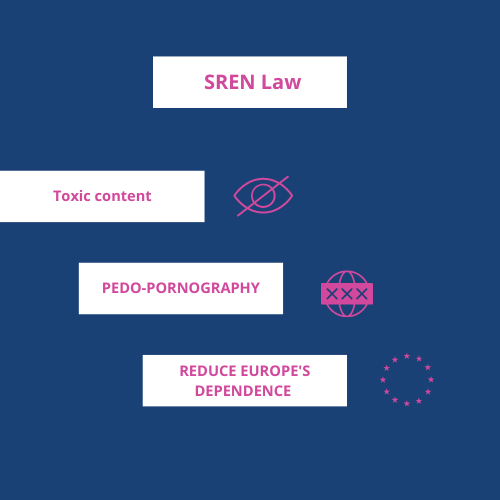The SREN law
The SREN law is firmly committed to protecting citizens’ rights in the face of the many challenges of the digital world. Discover the law in this article
The SREN law is firmly committed to protecting citizens’ rights in the face of the many challenges of the digital world.
This legalization, which France initiated within the European Union, aims to :
- Regulate the distribution of potentially toxic/ harmful content
- Enhance protection for children from online pornography
- Reduce Europe’s dependence on the three major American cloud companies (Amazon, Microsoft and Google).
The law seeks to strike a balance between citizen protection, addressing abuses, and preserving internet freedom.

Limiting the distribution of potentially toxic content
Despite the existence of reliable tools, public authorities are finding it difficult to guarantee adequate protection of the public, especially children, on the Internet.
That’s why France is introducing a range of sanctions available not only to regulatory authorities, but also to judges, to combat cyber-maliciousness and cyber-bullying.
Penalties applicable to platforms include up to 6 months’ imprisonment for cyberbullying.
The convicted person will also be banned from using social networks or creating new accounts.
If the account is not blocked, a financial penalty of €75,000 will be imposed.
In addition, social networking platforms are required by law to take into account the consequences for the health of their users, and to make the necessary corrections.
To counter Deep fakes, senators voted in favor of two amendments:
- An amendment penalizing the dissemination of content generated by artificial intelligence on a person without their consent, without mentioning that it is a fake.
- Another amendment sanctioning any person or site sharing sexual videos created by artificial intelligence without the consent of the person concerned.
In addition, to defend itself against disinformation from foreign media (such as Sputnik or Russia Today France), Arcom will have the right and power to ask the latter to stop all broadcasts within 72 hours.
Otherwise, Arcom can block the site and impose a fine of up to 4% of the operator’s turnover.
Recently, prohibition measures have been adopted for people under the age of 18 with regard to online gambling (Jonum). This includes the introduction of an age verification mechanism and the obligation to inform players of the risks of addiction.
Finally, an anti-scam cybersecurity filter implemented to protect citizens from fraudulent attempts to access personal data.
This filter alerts citizens via a database of all malicious sites identified and reported by victims to the administrative authorities.
18 million French people are victims of Internet scams of all kinds, and 9 million of them are experiencing financial losses.
The fight against pedo-pornography
With almost 2.2 million minors visiting pornographic sites in France every month, or 12% of the total audience of sites initially intended for adults, making the dissemination of child content a major concern.
It is important to note that it is not only pedophile criminals who distribute this content, but also minors themselves, sometimes in return for payment.
Against this backdrop, the Senate has taken significant steps by adopting a number of amendments:
- The systematic display of a warning message before the broadcast of any pornographic content simulating rape or sexual assault.
- Any person with a contractual relationship with a publisher of pornographic content will be able to ask hosts to remove the content.
- The Senate also adopted a provision enabling Arcom to block sites that fail to comply with legal controls on the age limits of their users.
If the police or gendarmerie report child pornography sites to the hosts, the latter are required to remove their content within 24 hours, under penalty of one year in prison and a fine of €250,000.
Reduce European dependence on the three big American cloud companies
Cloud computing has become essential for managing and storing large amounts of data.
However, these services are largely dominated by three major American companies (Amazon, Microsoft and Google), creating a worrying dependency.
What’s more, American companies are subject to FISA spying laws.
They are therefore required to share all collected data with the American secret services without prior notice to stakeholders.
This poses a major problem when it comes to sensitive data (health data, individual privacy, etc.).
For this reason, the SREN law offers an alternative by promoting the use of European cloud services, such as those provided by Oodrive, thus ensuring the protection and legality of stored information.
In Europe, the Cloud market is set to grow from 53 billion euros in 2020 to 560 billion euros in 2030, representing annual growth of 25%.
Today, this growth belongs to the three American leaders mentioned above.
To address this issue, the SREN law proposes three key measures to mitigate this dependence:
- Prohibition of data transfer fees.
- Limitation of cloud credits over time.
- Strengthening the interoperability of cloud services, thus promoting fair competition.
The SREN law seeks to combat child pornography and the dissemination of toxic content by imposing severe penalties on offenders, demonstrating the European Union’s commitment to ensuring digital safety, particularly for children.
It also aims to reduce Europe’s dependence on American leaders, guaranteeing the protection of sensitive data and promoting fair competition in the cloud market.
